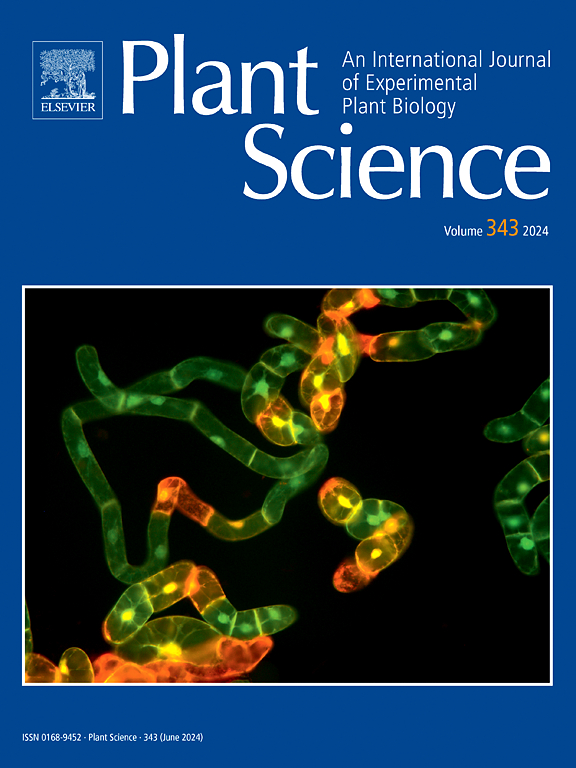Nitric oxide stimulates digestion modifying the nutrient composition of the traps’ fluid of Nepenthes x ventrata
IF 4.2
2区 生物学
Q2 BIOCHEMISTRY & MOLECULAR BIOLOGY
引用次数: 0
Abstract
External digestion performed by autotrophs is a characteristic feature of carnivorous plants, such as those of the Nepenthes spp. These plants developed jug-shaped traps filled with digestive fluid that consists of water, various proteins (mostly enzymes), and nutrients. Moreover, the presence of reactive oxygen species (ROS) and reactive nitrogen species (RNS) in the traps’ fluid of N. ventrata has been demonstrated. RNS, among them nitric oxide (NO), accelerates digestion e.g. by the alteration of ROS levels. The aim of the study was to demonstrate the stimulation of external digestion by NOx supplementation linked to the modulation of the nutrient composition of the trap fluid, digestive enzyme activity and gene transcription. Using the digestion fluid of N. ventrata mature traps we indicated that NOx temporarily increases K, Fe, Cu and ammonia that may be involved in the modulation of free radicals content. The stimulatory effect of NOx on the activities of enzymes responsible for digestion, and on the transcripts’ levels of Nepenthesin I and II, Purple Acid Phosphatase, and S-like Ribonuclease was shown. The decrease in the level of carbonylated proteins (from food source) in the trap’ fluid during digestion suggests their absorption by Nepenthes trap tissues. We also demonstrated the presence of carbonylated proteins in the trap fluid before feeding.
一氧化氮刺激消化,改变腹蜈蚣草陷阱液体的营养成分。
自养生物进行外部消化是肉食性植物的一个特征,例如Nepenthes一类的植物,这些植物形成了壶状的陷阱,里面装满了由水、各种蛋白质(主要是酶)和营养物质组成的消化液。此外,研究还证实了N. ventrata的圈闭流体中存在活性氧(ROS)和活性氮(RNS)。一氧化氮(NO)等RNS通过改变活性氧水平等方式加速消化。本研究的目的是证明补充氮氧化物对体外消化的刺激与陷阱液的营养成分、消化酶活性和基因转录的调节有关。利用N. ventrata成熟陷阱的消化液,我们发现NOx暂时增加了K、Fe、Cu和氨,这可能参与了自由基含量的调节。结果表明,氮氧化物对消化酶活性的刺激作用,以及对Nepenthesin I和II、紫色酸性磷酸酶和s样核糖核酸酶转录本水平的刺激作用。消化过程中陷阱液体中羰基化蛋白质(来自食物来源)水平的下降表明它们被nepenpen草陷阱组织吸收。我们还证明了在喂食前捕获液中存在羰基化蛋白质。
本文章由计算机程序翻译,如有差异,请以英文原文为准。
求助全文
约1分钟内获得全文
求助全文
来源期刊

Plant Science
生物-生化与分子生物学
CiteScore
9.10
自引率
1.90%
发文量
322
审稿时长
33 days
期刊介绍:
Plant Science will publish in the minimum of time, research manuscripts as well as commissioned reviews and commentaries recommended by its referees in all areas of experimental plant biology with emphasis in the broad areas of genomics, proteomics, biochemistry (including enzymology), physiology, cell biology, development, genetics, functional plant breeding, systems biology and the interaction of plants with the environment.
Manuscripts for full consideration should be written concisely and essentially as a final report. The main criterion for publication is that the manuscript must contain original and significant insights that lead to a better understanding of fundamental plant biology. Papers centering on plant cell culture should be of interest to a wide audience and methods employed result in a substantial improvement over existing established techniques and approaches. Methods papers are welcome only when the technique(s) described is novel or provides a major advancement of established protocols.
 求助内容:
求助内容: 应助结果提醒方式:
应助结果提醒方式:


